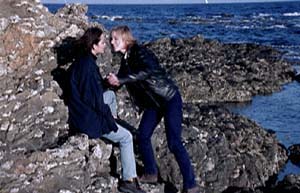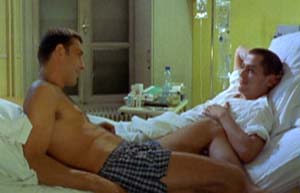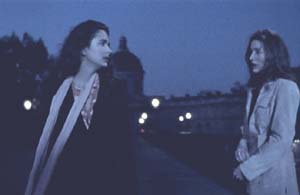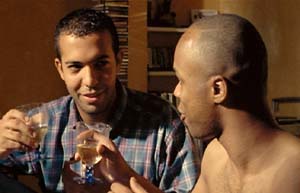
|
It's an extraordinary moment. The quick montage of La mouette, following the tumultuous emotional currents of its questioning siren, gives way to an enveloping ebb. The increasing intimacy of the camera pulls the viewer into the emotional epiphany of, not the primary character, but the receiver of her love. And her tears are devastatingly joyous. The narrative efficiency represented by the device of the tape recording is not as hokey as it seems. As methods of communication change, Tavernier expresses the sincerity that remains. As the contexts of love (AIDS, overt queerness, sexual questioning, boundaries to intimacy) change, the spiritual essence of love (connection, faith) continues eternal. Love Reinvented delivers one "close-up" cathartic moment after another. Sure it's not cinema reinvented, but it is - oh so gloriously and pleasurably - cinema reinvigorated.
I make the jump from gay film to gay art in general because the structure of Love Reinvented, a collection of twelve mostly French short films by twelve different directors, reflects developments in popular music and in theatre - revived in film - during the era of AIDS. It is the reality of AIDS that connects the twelve diverse short films in Love Reinvented. In that sense, the series shares the didactic, yet expansive and dramatic, urgency of AIDS-based theatrical drama. Françoise Decaux-Thomelet's Enceinte ou lesbienne explicitly utilizes theatrical techniques, opening the red curtains onto a surreal scenario. In this brief space and time, the parental reactions to the title question "Pregnant or lesbian?" swiftly move from anger to accusation, acceptance to revelation. The nature of that revelation relates explicitly to questions about gayness and (im)mortality (literally "Pregnant or lesbian?") that AIDS brought home to the gay community: historically and on deeply intimate, personal levels. In clarifying those two ramifications of AIDS, the shorts of Love Reinvented ingeniously confront the questions posed by the ambiguous ending of Enceinte ou lesbienne.
Meanwhile, the humorous, sunlit gorgeousness of Merzak Allouache's Dans la decapotable features to-die-for actors Julien Lambroschini and Guillaume Depardieu as lovers dealing with matters of fidelity. They do so in necessarily fresh ways, highlighted by the short's overt (but giddy-witty) "message" about safe sex. Each short exhibits the condensed, vividly evocative approach to a variety of reflections on AIDS and its imprint on gay experience shared by the best gay pop songs. Such songs deal with mourning and the yearning for transcendence in deeply creative manners. Notably the final film in the collection, Stephen Jones' Cherish offers existing gay culture (specifically, the party scene) as an avenue to "dance away the pain" (as het Bryan Ferry with Roxy Music once, prophetically, discoed). The Eden of Black male physique and relations in Paul Vecchiali's Les larmes du sida equates desire with innocence, death with knowledge. The ghostly point of view that structures the film turns every glancing camera move over Jean-Michel Monroc's body into a validation of life through longing (evocatively shared by the spectator). Also filmed from the p.o.v. of an unseen character, Pierre Salvadori's Un moment. . . challenges audience desire in the context of AIDS during a one-nighter. That film's climax proves unshakably intimate, as do the depictions of loneliness in Marion Vernoux's Ded@ns and Anne Fontaine's Tapid du sour. In each, the gay male leads act out in order to ameliorate their isolation: in one, by videotaping his fantasy life; in the other, by playing at being a street hustler.
"Interesting! / Pleasant!" exclaim two witnesses to a man in Une nuit ordinaire singing a tune while riding his bike to stay with his hospitalized lover. Demules directs in the style of agit-pop duo Martineau-Ducastel's musical-esque The Adventures of Felix and post-musical Jeanne and the Perfect Guy. The entire world seems to dance, in a wistfully naturalistic choreography, as the lover sings: "The only home that's worth a prayer." Now available for home viewing on DVD, Love Reinvented answers the prayers of gay movie audiences. |
|
 La mouette
La mouette Une nuit ordinaire
Une nuit ordinaire  Et alors
Et alors Tout n'est pas en noir.
Tout n'est pas en noir.